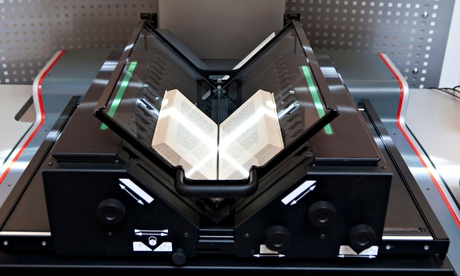
A few years ago, I had a go on a book-scanning machine at the Internet Archive in San Francisco, used for making clear digital copies of book pages. The most common machines of this kind are simple physical mechanisms: a book is held open in a cradle and pushed upwards against two angled glass plates. The movement triggers a pair of digital cameras, which simultaneously photograph the flattened pages, and the process is repeated, by hand, for each spread. As I pushed down on the lever and the shutters fired, it struck me that this was a kind of reverse press, of the most ancient Gutenberg kind. Instead of a block of ink-stained type being pressed on to a page, the book itself is pressed towards the light and its contents are released into the digital ether, to be republished, retransmitted once again.
I thought about this process once again with the launch of Canelo, a new publishing house created by Iain Millar, Michael Bhaskar and Nick Barreto, three experienced digital publishers. Canelo opened this week with three books available across all the usual digital platforms, and a promise to develop more app and web content in the future. As a purely digital company, it is able to offer innovations such as five-year licences, 50% royalties and in-house author websites; what it calls “a properly adapted digital publisher”.
In the week of its launch, Canelo also built a book scanner, in Bhaskar’s spare room. Canelo is planning to produce about 100 ebooks in the next year, of which 30 to 40 will need scanning. Its own scanner gives it much more control over this process: poorly scanned books are commonplace and lead to more errors further down the line. In turn, this depresses editorial and design values, leading to the not uncommon critical distaste for ebooks. It’s rare for startups to commit to the most labour-intensive parts of the ebook process, but as Bhaskar puts it: “The best publishing tends to be hands-on publishing.”

